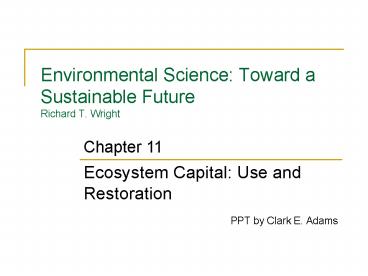Environmental Science: Toward a Sustainable Future Richard T' Wright - PowerPoint PPT Presentation
1 / 36
Title:
Environmental Science: Toward a Sustainable Future Richard T' Wright
Description:
How they sustain human life and economies. Positive and negative ... Shrimp aquaculture. Coastal development. Public and Private Lands in the United States ... – PowerPoint PPT presentation
Number of Views:75
Avg rating:3.0/5.0
Title: Environmental Science: Toward a Sustainable Future Richard T' Wright
1
Environmental Science Toward a Sustainable
Future Richard T. Wright
Chapter 11
- Ecosystem Capital Use and Restoration
- PPT by Clark E. Adams
2
Ecosystem Capital Use and Restoration
- Global perspective on biological systems
- Conservation, preservation, restoration
- Biomes and ecosystems under pressure
- Public and private lands in the United States
3
What We Need to Know about Ecosystems
- How they sustain human life and economies
- Positive and negative effects of ecosystem
conversions - Sustainable approaches to ecosystem management
4
(No Transcript)
5
Natural Ecosystems on Earths Surface Table 11-1
- Total land area 57.6 million square miles
- Total ocean area 172.6 million square miles
mostly open ocean
6
Wetland Services
- Valued at 100,000 per acre per year
- Water purification and fish propagation
7
Renewable Resources
- An ecosystems natural capacity to regenerate
- It has the capacity to replenish despite certain
quantities of organisms being taken from it
8
Conservation versus Preservation
- Conservation managing or regulating use so that
it does not exceed the capacity of the species or
system to renew itself - Preservation ensure species or ecosystem
continuity regardless of their potential utility
9
Patterns of Use of Natural Ecosystems
10
Tragedy of the Commons
- Begins with unregulated access to a resource
owned by no one. - Harvest based on largest amount over the shortest
period of time. - No thought given to sustainable harvests.
- Usually ends with no resource for anyone.
11
Preventing a Tragedy of the Commons
- Private ownership
- Regulated access
- Sustained benefits
- Fairness in access rights
- Common consent of the regulated
12
Principles Incorporated into Public Policies to
Protect Natural Resources (Table 11-2)
- Natural resources cannot be treated as an open
commons. - Sound science needed to assess health and level
of resource use. - Precautionary principle should be used in setting
limits for exploitation.
13
Principles Incorporated into Public Policies to
Protect Natural Resources (Table 11-2)
- Regulations should be enforced.
- Economic incentives that encourage the violation
of regulations should be eliminated. - Subsidies that support exploitation should be
removed.
14
Principles Incorporated into Public Policies to
Protect Natural Resources (Table 11-2)
- Suitable habitats for the resource should be
preserved and protected from pollution. - The sustenance needs of people living close to
the resource should be met.
15
Restoration
- The intent of ecosystem restoration is to repair
the damage to specific land and waters so that
normal ecosystem integrity, resilience, and
productivity returns.
16
Everglades
- The largest restoration project ever conceived
- The Comprehensive Everglades Restoration Plan
(CERP)
17
Biomes and Ecosystems under Pressure
- Forest biomes
- Ocean ecosystems
- Coral reefs and mangroves
18
Forest Biomes
- Conserve biodiversity
- Moderate regional climates
- Prevent erosion
- Store carbon and nutrients
- Provide recreational opportunities
- Provide a number of vital goods
19
World Forest Biomes
20
Causes of Deforestation
- Conversion into pastures and agricultural lands
21
Silviculture Forest Management with Harvest Goals
- Even-aged management
- Clear-cutting no tree left behind
- Uneven-aged management
- Selective cutting
22
Causes of the Loss of Tropical Rain Forests
- Colonization consolidation of agricultural lands
- Huge national debts
23
Conserving Tropical Rain Forests
- Ecotourism
- Extractive reserves
- Management by indigenous people
- Rubber plantations
- Sustainable logging
24
Sustainable Forest Management
- Manage for sustainable outcomes
- Teach others
- Protect the health of the forest
- Recognize and protect unique forest ecosystems
- Strive to be better forest managers
25
Mangroves
- Protects coasts from storm damage and erosion
- Forms rich refuge and nursery for marine fish
26
Coral Reefs
- Important food sources for local people
- Wave erosion control
- Great diversity of marine vertebrates and
invertebrates
27
Sources of Damage to Coral Reefs
- Warm water
- Eutrophication
- Islander poverty
- Logging
- Shrimp aquaculture
- Coastal development
28
Public and Private Lands in the United States
- National parks and national wildlife refuges
- National forests
- Protecting nonfederal lands
- Conclusion
29
Federal Lands (40) in the U.S.
30
The Greater Yellowstone Coalition
31
Wilderness Act of 1964
- Provides for permanent protection of undeveloped
and unexploited areas so that natural ecological
processes can operate freely - 4 of land area in U.S.
- Preservation, not conservation
32
National Forests
- Only 5 of the original U.S. forests are left
- Most U.S. forests are second growth
http//www.fs.fed.us/r5/lassen/fire/gallery/
33
Environmental Concerns
Reagan
Clinton
Post WW II Housing Boom
34
New Forestry Ecosystem Management
- Cut trees less frequently
- Leave wider buffer zones along waterways
- Leave dead logs and debris
- Protect broader landscapes
- Build no new roads until damage to old ones is
addressed
35
Protecting Nonfederal Lands
- Land Trust Alliance
- Nature Conservancy
- Trustees of Reservations in Massachusetts
36
Conclusions?
- We are plundering our childrens heritage to pay
for our present unsustainable practices.































